I first met Charlie in 1973, when I was a sophomore at Fordham University. I had heard him many times on CBS Radio and admired his work. So I wrote him a letter and asked if he had any advice for an aspiring broadcast journalist.
To my delight, Charlie wrote back. “I’m afraid I’m not much on advice,” he said. “But as you may know, I’m an old Ram myself. If you’d like to visit the Broadcast Center sometime, give a call and I’ll lay on the fifty cents tour for free.”
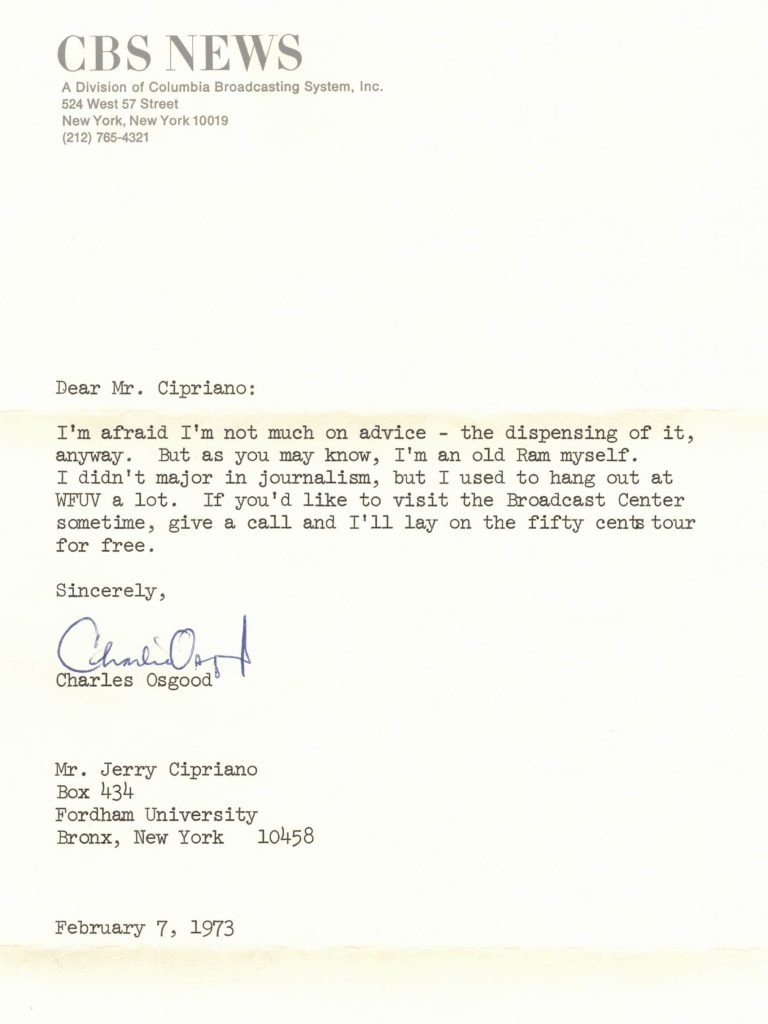 I called right away, before he could forget who I was, and one winter morning, I hopped on the D train in the Bronx and headed down to CBS News headquarters on West 57th Street in Manhattan.
I called right away, before he could forget who I was, and one winter morning, I hopped on the D train in the Bronx and headed down to CBS News headquarters on West 57th Street in Manhattan.
Charlie had one of the most distinctive voices in radio. And over the years, I had formed a mental picture of him to match it. I thought. When Charlie greeted me, the voice was familiar but the image was not. I could not believe that amazing voice was coming out of this stranger. As he showed me around, it took a while before the voice and the speaker synced up in my mind.
Charlie bought me breakfast at the CBS cafeteria. He told me he had spent a lot of time in his Fordham days at the student-run radio station, WFUV. I took that as a suggestion, and when I returned to campus, I headed to the station and went to work in the news department.
A decade later, after working as an AP broadcast writer and editor, I was offered a job at CBS News, at the radio network, where Charlie was the star. By then, he had long since forgotten me, but we soon reconnected when I was assigned to write radio newscasts for him.
Charlie always ended with a kicker. One he wrote that I’ll never forget was about a truck flipping over and spilling its cargo of cookies all over the roadway. Charlie ended by saying:
“That’s the way the (pause) ball bounces. Fooled you!”
Brilliant.
My job when I wrote for Charlie was to find a kicker worthy of him and write it well. It was a challenge I enjoyed.
One Sunday night, I wrote a kicker for his 8 p.m. radio newscast about a study that found watching too much TV could make you fat. The punchline: “Someone once called television a vast wasteland. Looks like too much of it could lead to a vast waistline.”
Charlie looked at the copy and said, “This is good enough to steal.” And steal it he did. He used the line again on his 11 p.m. television broadcast.
That broadcast was called the CBS Sunday Night News. It was 15 minutes long and, in 1986, I became Charlie’s writing partner on it. We split up the stories and challenged each other each week to come up with the best line. I never had so much fun in my life.
I will always be grateful to Charlie for the kindness he showed me as a young college student and for the privilege of working with him as a colleague. May he rest in peace.
—Jerry Cipriano, FCRH ’75, retired in 2018 as senior news editor of the CBS Evening News. He began his journalism career at the Associated Press while still attending Fordham. He joined CBS News in 1984 as a writer for network radio and moved over to television news in 1986.
A version of this essay originally appeared in Connecting, a newsletter for retirees and former employees of the Associated Press. It is republished here with the kind permission of the newsletter’s editor, Paul Stevens.
Watch this on-air tribute to Jerry Cipriano during the last of his many CBS Evening News broadcasts. Anchor Jeff Glor describes him as “a mentor, a friend, and master craftsman who has written the first draft of history for more than three decades.”
]]>‘The Voice of Reason in an Often Unreasonable World’
In a nearly five-decade career at CBS, the 1954 Fordham graduate was known for his distinctive voice and style, his intellect and sense of humor, and a warm, measured tone. He had a predilection for bow ties and a penchant for rhyme that earned him a reputation as CBS News’ “poet in residence.”
A master communicator, he was also a bestselling author of several books, a lyricist who scored an improbable hit in 1967, and a talented musician who played banjo with the Boston Pops and piano with the New York Pops. He could cover hard news “as straight as a string,” as he once put it, and deliver poignant human-interest stories with a wit and authenticity that endeared him to generations of listeners and viewers—both on Sunday Morning and on his syndicated radio show, The Osgood File.
“Charles Osgood has been a presence in all of our lives for decades,” said Tania Tetlow, president of Fordham. “His gentle and poetic delivery of the news, the wisdom of his observations—everything about him spoke of steadiness and integrity. He was the voice of reason in an often unreasonable world. We will all miss him terribly.”
‘The Theater of the Mind’
Born in the Bronx in 1933, Charles Osgood Wood III moved to Baltimore with his family in 1939 and grew up in the city’s Liberty Heights neighborhood, an experience he recalled in his 2004 memoir, Defending Baltimore Against Enemy Attack: A Boyhood Year During World War II. The year was 1942, and it was “the best of times and the worst of times,” he wrote, as he was surrounded by siblings, friends, and baseball—but against the backdrop of the Great Depression and World War II.
“Although memory has a built-in sugarcoater, and childhood is seen through the cotton candy of time, I have always been certain that there was a genuine sweetness to the days when I was nine years old and the country was united in winning the last good war, if there could have been such a thing,” he wrote.
It was also a time when he developed his love for radio, which he called the “Theater of the Mind” and “the greatest show on earth.”
An Education in the ‘Process of Orderly Thinking’
Osgood moved back north in 1946 to attend St. Cecilia High School in Englewood, New Jersey, before returning to the borough of his birth as a student at Fordham College at Rose Hill. He majored in economics—“not communication arts or journalism, as some might think,” he told Fordham Magazine in 1980.
“In those days at Fordham we also studied such arcane subjects as epistemology, cosmology, and ontology. It didn’t seem possible that I’d even make a living from them, but I swear I am! That’s because they developed in me the process of orderly thinking—the methodology of going from one step to another,” he said.
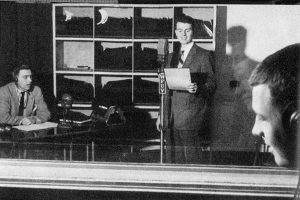
Osgood honed his broadcasting craft working at WFUV, Fordham’s public media station, during his years at Rose Hill. The station, founded in 1947, was just a few years old when he started. He eventually hosted his own show, No Soap Opera, and worked alongside other future luminaries including Alan Alda, FCRH ’56. “When I wasn’t on duty there I would just stay around because I enjoyed it so much,” he said.
After graduating in 1954 with that radio experience, Osgood was hired as an announcer by WGMS, a classical music station based in Washington, D.C. Soon after, though, he joined the military as an announcer for the United States Army Band, a role that he held until 1957. While serving near the Arlington National Cemetery, Osgood took on jobs at several Washington, D.C.-area radio stations under pseudonyms, and in the book Kilroy Was Here: The Best American Humor from World War II, he tells the story of being tasked with DJing a closed circuit radio broadcast for President Dwight D. Eisenhower while the commander in chief recovered from a heart attack in Colorado in 1955.
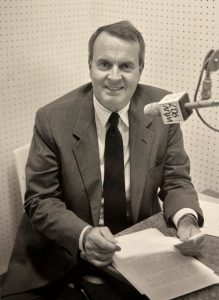
“I was put into a studio with a stack of records that had all been chosen as his favorites,” Osgood recalled. “And I spent most of the day playing records for Eisenhower.”
During his stint with the Army Band, he also “got to write some lyrics for the band and chorus,” he said in the 1980 Fordham story. “That’s when I really began versifying.”
From the Army, Osgood returned to WGMS until 1962, when he got his first job in television as the general manager of WHCT in Hartford, Connecticut. When the station ran into budget issues and Osgood was fired in 1963, he got his next break thanks in part to a fellow Fordham graduate, Frank Maguire, FCRH ’56, who was in charge of program development at ABC in New York at the time. Osgood joined ABC Radio as a writer and co-host of Flair Reports, which featured human interest stories.
“It had been years since he had seen me work, but he had enough faith to recommend me for the job,” Osgood said of Maguire. It was at ABC that he decided to change his professional name. “My own name was Charles Wood, but since there was another fellow in broadcasting [at ABC] named Charles Woods, I decided to use my middle name, Osgood.”
Beginning a Long Tenure at CBS
In 1967, he began working for CBS, where he would spend the rest of his career. Starting as a radio reporter for WCBS, he moved to the television news division in 1971, the same year he began hosting what would eventually become The Osgood File, short radio segments broadcast on stations across the country multiple times a day, four days a week.
On television, he started as a reporter and became an anchor of CBS Sunday Night News in 1981, followed by stints as a co-anchor of CBS Morning News, a news reader on CBS This Morning, and an anchor of CBS Afternoon News and CBS Evening News with Dan Rather.
It was his next role at CBS for which Osgood became best known: In 1994, he succeeded Charles Kuralt as host of Sunday Morning, where his trademark style as a calm, upbeat presence gave viewers a relaxing alternative to other Sunday morning programming.
“We accentuate the positive and don’t try to shock,” Osgood once told a reporter. ”I think there’s a growing appetite for that. We’re surrounded by shock.”
He hosted his last episode of the program on September 25, 2016, signing off with his signature “I’ll see you on the radio,” before thanking his viewers and the staff of the show. He continued to host episodes of The Osgood File until December 2017.
Osgood received numerous honors throughout his career. He was inducted into the National Association of Broadcasters Hall of Fame in 1990, earned a lifetime Emmy Award in 2018, and received many other accolades, including the Walter Cronkite Award for Excellence in Journalism, the Radio Television Digital News Association’s Paul White Award, four other Emmy Awards, and three Peabody Awards.
The Patron Saint of WFUV News
In 2008, WFUV honored Osgood alongside Dodgers broadcaster Vin Scully, FCRH ’49, one of the first student voices on the station, with lifetime achievement awards in news and sports broadcasting, respectively. The awards, subsequently renamed in their honor, are presented annually to journalists who reflect Osgood’s and Scully’s standard of excellence.
“All of us at the station are saddened by Charles Osgood’s passing,” said Chuck Singleton, general manager of WFUV. “He was the patron saint of WFUV News, a mentor to our young journalists, and a distinguished link to the station’s founding generation of news professionals. Charles liked to say, ‘I went to the University of WFUV.’”
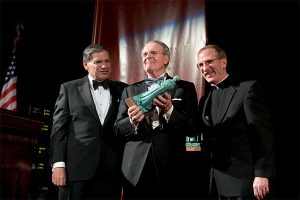
Osgood stayed extremely engaged with his alma mater and WFUV throughout his life. He was a Fordham trustee fellow and an emcee at numerous Fordham events, including the annual Fordham Founder’s Dinner, where he was among the honorees in 2005. Fordham also honored him in 2010, when he was inducted into the University’s Hall of Honor. He received an honorary degree from Fordham and delivered the commencement address to the Class of 1988, encouraging them to “stand for the values that shaped you here at Fordham.”
He occasionally returned to WFUV and was a frequent attendee of the station’s annual On the Record gala, at which other broadcasting legends—including Ted Koppel, a friend who started at ABC on the same day as Osgood in 1963, and Jane Pauley, who succeed him as host of Sunday Morning—received the Charles Osgood Lifetime Achievement Award.
“Everything I learned in my career, I learned at FUV,” Osgood said at the station’s 60th anniversary celebration in 2007. And while he thought the station’s new-at-the-time broadcast center on the lower level of Keating Hall was “better than CBS,” he reminded the audience that “it’s not equipment that teaches you. The most important equipment is not in a box, but what goes on in your own brain and your own heart.”
A Mentor to Fordham Students and Alumni
That lesson is one he conveyed to generations of Fordham graduates, including Emmy Award-winning producer Sara Kugel, FCRH ’11, who started working at Sunday Morning as a broadcast associate in 2012.
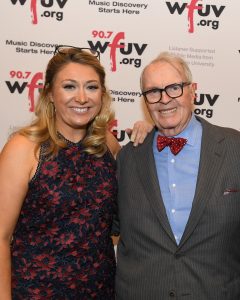
“I grew up watching Sunday Morning, and that was just a routine we had in our household. It was the only show my family really watched together,” she recalled, noting that she was “very much drawn” to Osgood’s warmth, gravitas, and intelligence.
“I wasn’t sure if I wanted to go into journalism then, but … once I started looking at Fordham, the fact that WFUV existed on campus, and that it had produced Charles Osgood? You can’t get it better. There’s nothing more inspiring than that.”
Over the years, the two bonded over their shared Fordham connection. Kugel recalls listening to a WFUV livestream of a Fordham football game with him one Saturday afternoon. “Of all the people I’ve met, I would say I found him to be very authentic,” she said. “Who he was on camera, really, it matched who he was in person.”
CBS New York’s Alice Gainer, FCRH ’04, echoed that sentiment. Following her Tuesday evening segment on Osgood’s life and legacy, the award-winning anchor and reporter shared some personal thoughts about Osgood with viewers, noting that in 2013, she “had the privilege of sitting on a journalism panel with him, since we’re both Fordham and WFUV alums.”
“What stood out to me was just how sharp he was—everything about him was so distinctive: his voice, his style. You know, you turn on the TV now, you see a lot of the same. He truly stood out. He leaves quite a legacy. And I have to point out, I’m sitting there thinking, ‘What am I doing on a panel with Charles Osgood?’ But he didn’t treat me that way. He treated me like a peer, and that meant so much. And he, you know, he’s still inspiring so many journalists to this day.”
A Fordham Family
The Fordham connection extended to his family. His wife, Jean Crofton, graduated from Fordham College at Lincoln Center in 2002, and two of their sons, Kenneth Winston Wood, FCLC ’98, and Jamie Wood, FCLC ’05, are Fordham alumni.
Fordham was “the first place where he was given a voice and the ability to tell stories on a platform when there were not as many platforms to be able to captivate an audience,” Jamie Wood said. “I think he always felt a great deal of gratitude and indebtedness to the Fordham community for creating the conditions that allowed that to happen.”
Wood added that his father’s disposition and personality on TV and radio reflected his personality at home.
“There was not really much of a performance element to it just because it’s just who he was,” he said. “He was the single most optimistic person that I’ve ever known. I think that he had an ability to see the inherent goodness of anyone and led with any storytelling or any interaction with that baseline assumption, that there’s fundamental good in every person that he is talking to, that he’s engaging in some way, and I think that that’s one of the things that made him beloved and endeared by so many.”
A Life Filled with Music and Community
While Osgood was known most widely for his talking and writing, many will also remember him as an enthusiastic singer, musician, and composer—who not only loved to perform for friends and family but who wrote the lyrics to two songs that achieved some level of wider success, “Gallant Men” and “Black is Beautiful.”
“I will always treasure being on set when Charlie would play the piano and sing,” Kugel said. “Witnessing Charles Osgood play ‘I’ll be Home for Christmas’ on the Sunday Morning set was pure magic. Only a few people would be in the studio during those tapings, but it seemed there wasn’t a dry eye in the room. We all knew we had witnessed something very special. It felt like heaven.”
In his final radio segment, broadcast on December 29, 2017, Osgood gave a brief history of Robert Burns’ familiar poem “Auld Lang Syne” and recited a version of his own, over the sound of pensive bagpipes, as a farewell to his listeners:
“The memories of days gone by—old times, old friends, and all—
faces, voices of the past our minds can still recall.
They live still in your memory, as they still live in mine,
as we lift a cup this Sunday eve for Auld Lang Syne.”
Osgood is survived by his wife, Jean Crofton; their five children, Kathleen Wood Griffis, Kenneth Winston Wood, Anne-E. Wood, Emily J. Wood, and Jamie Wood; two siblings; and six grandchildren.
“My dad above all loved other people’s company,” Jamie Wood said. “It wasn’t being a public figure, it wasn’t being a journalist. He just loved being around community, and so thank you for welcoming him into your homes and into your radios to be able to … share stories, to share the better parts of humanity. And he will see you on the radio.”
—Ryan Stellabotte contributed to this story.
]]>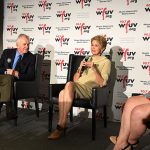

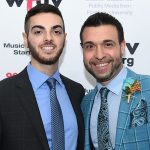


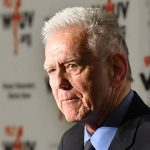
A trio of giants from the worlds of sports and news broadcasting was feted at WFUV’s annual On the Record awards dinner on Oct. 1.
The event honored television journalist Jane Pauley, sportscaster and former baseball catcher Tim McCarver, and retired ESPN executive and Fordham Trustee Fellow Christine Driessen, GABELLI ’77, for their decades of achievements in their respective fields.
Held at the Lincoln Center campus, the dinner was a celebration of both those at the pinnacle of their careers and those just starting out; two student broadcasters also received awards for their accomplishments. It was a particularly poignant evening for Pauley, who, after 30 years in news broadcasting, succeeded Charles Osgood, FCRH ’54, as host of CBS Sunday Morning in 2016.
Like Coming Full Circle
Pauley was presented the Charles Osgood Award for Excellence in Broadcast Journalism by CBS Sunday Morning producer Rand Morrison and Osgood himself, who sat next to her as she stood at the podium. Morrison said he knew they could never replace Osgood, but that Pauley has exceeded their every expectation.
“It was our lucky day at Sunday Morning, because suddenly the path became clear and all fell into place. Jane getting this award with Charlie’s name on it could not be more appropriate. It’s like coming full circle,” he said.
Pauley said she was still amazed to have gotten the best job of her life when she was 65, and confessed to feeling pressure to live up to the standards that Osgood upheld.
“When I first started at [CBS Sunday Morning], inevitably I would hear the voice of Charlie, [in my head] because no one spoke the language with such effortless eloquence, pacing, and timing as him. Maybe a year or two years went by, and I stopped trying to be you,” she said to him.
A Storied Career in Baseball
McCarver was a two-time all-star and two-time World Series winner who played for the St. Louis Cardinals, the Philadelphia Phillies, the Montreal Expos, and Boston Red Sox, from 1959 to 1980. He went on to call a then-record 23 World Series and 20 All-Star games and earn three Emmy Awards. On Tuesday, he was presented the Vin Scully Award for Excellence in Sports Broadcasting.
Scully, a 1949 graduate of Fordham College at Rose Hill, lauded McCarver in a short videotaped message from Los Angeles, where he called games for the Los Angeles Dodgers for 67 years before retiring in 2016. Steve Hirdt, a nationally recognized statistician and longtime friend of McCarver, presented him with the award. He noted that McCarver was able to bring into the broadcast booth the kind of knowledge that only someone with 21 years behind the plate can bring, such as the best way to run from third base to home when a ball is hit to the third baseman (shadow him, and then break for home if he throws to first).
“These things are things that would be delicious morsels of information not just to casual viewers, but to people such as myself who have watched baseball my entire life,” he said.
“When the rights to televised broadcast baseball shifted from one network to another, the first thing the networks would do is go after McCarver.”
In his acceptance speech, McCarver noted that when Roger Maris broke Babe Ruth’s homerun record in 1961, he was never walked by opposing pitchers, because fellow slugger Mickey Mantle batted after him. Just as this afforded Maris an opportunity, he said, his success was due in part to the generosity of others.
“This is a very emotional moment for me and my family,” he said, noting that because he’d won the award, he got the chance to speak with Scully over the phone for the first time.
“Vinny—you would have thought he played the game. He understood it like no man who hadn’t played it did.”
Trailblazing a Path for Women
In a first for the event, a third special tribute award was also bestowed, upon Christine Driessen, GABELLI ’77, who recently stepped down as executive vice president and chief financial officer for ESPN.
Driessen joined the network in 1985, and in 33 years, she rose to become the most-tenured senior woman there. She is credited with helping the network’s unprecedented growth during that time, and, in her remarks introducing her, Fordham women’s basketball coach Stephanie Gaitley hailed her as a trailblazer for successful women in sports.
Driessen credited Fordham with introducing her to power of sports in business and in life.
“Fordham taught me the value of leadership, integrity, humility, and most importantly, speaking up for those who need a voice, especially women in business, and women from around the world, for the power of sport,” she said.
In a discussion afterward moderated by Sara Kugel, FCRH ’11, the award winners touched on everything from what advice they’d give to students looking to pursue a career in their fields, to the future of those same fields. Driessen suggested students work hard, learn to ask for what they want, and learn to communicate effectively. She also emphasized the importance of mentoring others, a point Pauley revisited later in the conversation.
“Christine, just in case you want to go to bed tonight not wondering whether you influenced someone positively or not, ding!” she said, raising her hand in the air and pointing to herself.
Honoring Student Broadcasters
Proceeds from the awards dinner, which this year raised close to $160,000, help fund WFUV’s training programs for University students, two of whom also received recognition. Natalie Migliore, FCRH ’20, was given the WFUV Award for Excellence in News Journalism, and Charlie Maisano, FCRH ’20, was presented with the Bob Ahrens Award for Excellence in Sports Journalism—named for the station’s recently retired executive sports producer.
Migliore, WFUV’s current news director and a lead reporter for the station’s Strike a Chord campaigns, said she was grateful for the opportunity to work on extensively researched stories on air pollution in New York City and a school walkout against gun violence.
“WFUV is a gift to Fordham University students, and I’m beyond proud to enter the work force telling people where I started,” she said.
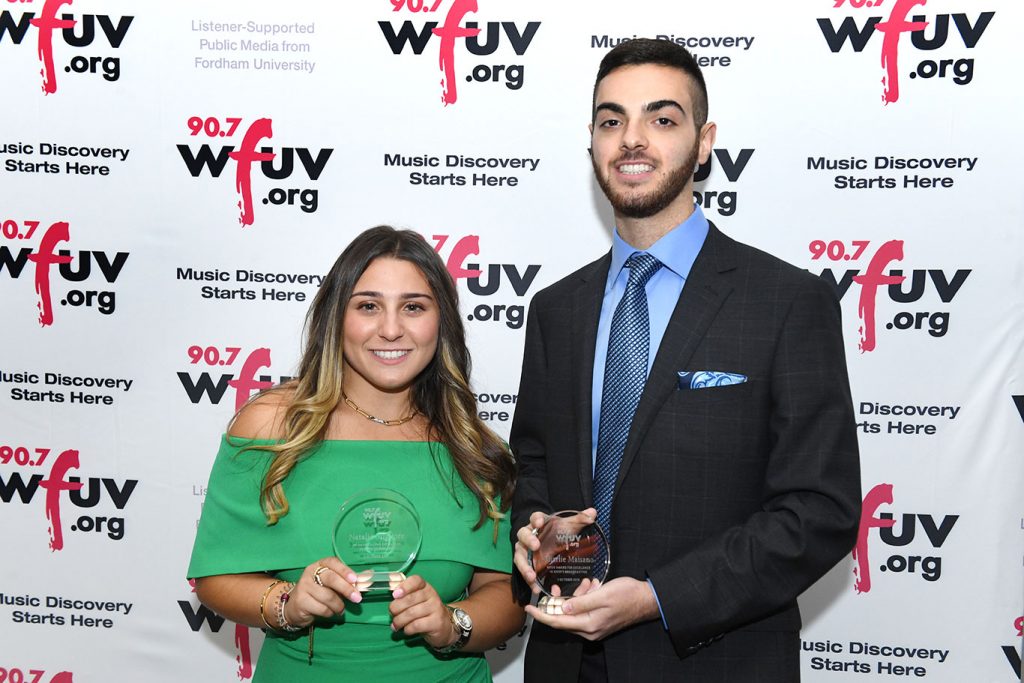
Both, it turns out, burnished their nascent broadcasting careers sitting next to each other at ABC News Radio after being hired on the same day in June 1963.
Both revisited the occasion, and the decades that followed, at On the Record, WFUV’s annual awards dinner, on Nov. 7 at Fordham Law School, at which Koppel received the CharlesOsgood Award for Excellence in Broadcast Journalism.
“You’re a model of broadcast journalism at its very best,” Osgood, FCRH ’54, a WFUV alumnus, said in presenting the award to his longtime friend.
Koppel recounted the pair’s early, but ultimately unsuccessful, effort to create a morning news show for ABC television. “We became friends, and we conspired on certain schemes to obtain fame and perhaps also hopefully wealth,” Koppel, who briefly attended Fordham Law School before committing full-time to journalism, jocularly recalled. “All of those schemes failed.”
Nevertheless, he said, with both he and Osgood now nearer to what Koppel called the conclusion of their professional journeys, “it turned out alright.”
Longtime New York Yankees broadcaster Michael Kay, FCRH ’82, was also honored at the dinner, as the recipient of the Vin Scully Award for Excellence in Sports Broadcasting,
The award, Kay said, had deep resonance given that it is named for his broadcasting idol.
“To be given an award with Vin Scully’s name on it is beyond anything I could have ever imagined,” Kay, who will start his 28th year calling Yankees games next spring, said following a short videotaped message from Scully. “He is the patron saint of WFUV Sports, he is the patron saint of anybody who does baseball play-by-play. He is the best at what he’s done.”
In presenting the award, John Filippelli, the president of production and programing at the YES Network, said Kay embodied excellence.
“You are truly a renaissance broadcaster, Michael,” he said. “You’re generous to all your boothmates. You’re warm. You’re extremely knowledgeable, always respectful. You really embody integrity.”
[doptg id=”130″]Proceeds from the awards dinner, which this year raised more than $230,000, help fund WFUV’s training programs for University students. Among the roughly 200 attendees were current CBS Sunday Morning anchor Jane Pauley, cartoonist Garry Trudeau, and former Mets and Yankees pitchers and current broadcasters David Cone and Al Leiter.
In a Q&A discussion moderated by Sara Kugel, FCRH ’11, a producer at CBS Sunday Morning, both Kay and Koppel soberly assessed the current state of journalism, with Koppel saying that both “the business side” of the industry and the internet were to blame for journalism’s decline. He suggested objective reporting was being compromised by the ease with which people can disseminate their views, which, he suggested, are too often noxious and divisive.
“The more outrageous you make that website, the more hits you’re going to get; the more hits you get, the more money you make,” Koppel said.
Kay agreed. “Any person who’s sitting in his mom’s basement with Cheetos dust on his fingers could report on news now,” he said.
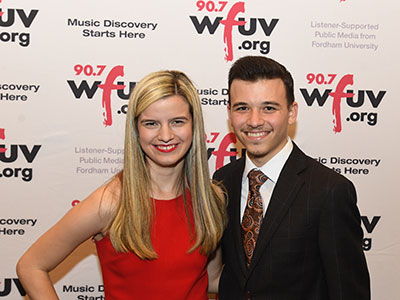
But Kay, who recalled that he has wanted to be Yankees broadcaster since he was 9 years old, nevertheless encouraged the 20 WFUV students at the awards dinner to pursue the trade with abandon.
Two of those students also received recognitions. Julia Rist, FCRH ’20, was given the WFUV Award for Excellence in News Journalism, and Raffaele Elia, FCRH ’19, was presented with the Bob Ahrens Award for Excellence in Sports Journalism—named for the station’s recently retired executive sports producer.
“Never turn down an opportunity to be on the air,” Kay told Rist, Elia, and their student colleagues. “Work harder than anybody else. That should be the norm. Just like running hard to first base should be the norm, not the exception.”
–Richard Khavkine
]]>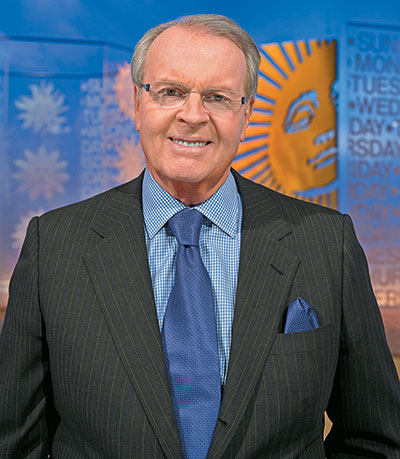
Legendary television and radio journalist Charles Osgood, FCRH ’54, received the 2017 News & Documentary Emmy Award for Lifetime Achievement on Oct. 5. at Jazz at Lincoln Center in New York City.
The National Academy of Television Arts & Sciences honored Osgood for his lasting contributions to broadcast journalism during his almost-50-year career, including his “gifted writing and mastery of the craft of the television news story; his unique humor and musical gifts; and his innate ability to engage his audience with warmth and credibility.”
Osgood retired last year as host of CBS Sunday Morning after 22 years with the Emmy-winning show. He continues to host The Osgood File, heard on radio stations across the nation. Osgood sometimes delivers the short-form daily radio show in verse, helping to earn him the title of “poet in residence” at CBS News.
Bob Mauro, president and CEO of the National Academy of Television Arts and Sciences, recalled working in the newsroom when Osgood was hosting the CBS Evening Weekend News: “He had the understated ease of a Southern gentleman even though he came from New York and possessed perhaps one of the greatest voices to have ever graced network television. Osgood’s character put you at ease, while his wit and humanity drew you in whether reflecting on stories large or small.”
When he retired from Sunday Morning, Osgood, 84, said people had been asking why he stayed with the show so long beyond traditional retirement age.
“It’s just that it’s been a joy doing it!” he responded. “Who wouldn’t want to be the one who gets to introduce these terrific storytellers and the producers and writers and others who put this wonderful show together?”
He once said of the features-focused show: “We accentuate the positive and don’t try to shock. .. I think there’s a growing appetite for that. We’re surrounded by shock.”
Osgood got his start at WFUV, Fordham’s public media station, which honored him in 2008 by establishing the Charles Osgood Award for Excellence in Broadcast Journalism.
]]>From l to r, students Jack McLoone, sophomore, Christian Goewey, senior, Drew Casey, senior, ESPN’s Brent Musburger, and WFUV’s Bob Ahrens. (Photo by Chris Taggart)
When the Denver Broncos defeated the Carolina Panthers at Super Bowl 50, Drew Casey, FCRH ’17, had a perspective of the action that was the envy of most of his peers.Casey, a native of Union, New Jersey, was broadcasting the game live from Santa Clara, California, for WFUV Radio (90.7 FM/wfuv.org).
For his work at the station, Casey was honored at On The Record, held Nov. 9 at Fordham’s Lincoln Center campus, with the Bob Ahrens Award for Excellence in Sports Journalism. Fellow student Jake Shore, FCRH ’18, who was unable to attend, received the WFUV Excellence in Journalism Award for news reporting.
“Covering the Super Bowl was incredible,” he said. “It almost makes me a little cautious about what comes after Fordham.”
At the ceremony, the station bestowed awards named for broadcast legends and WFUV/Fordham alumni Charles Osgood and Vin Scully. This year’s honorees were CBS News 60 Minutes correspondent Lesley Stahl and ESPN play-by-play broadcaster Brent Musburger.
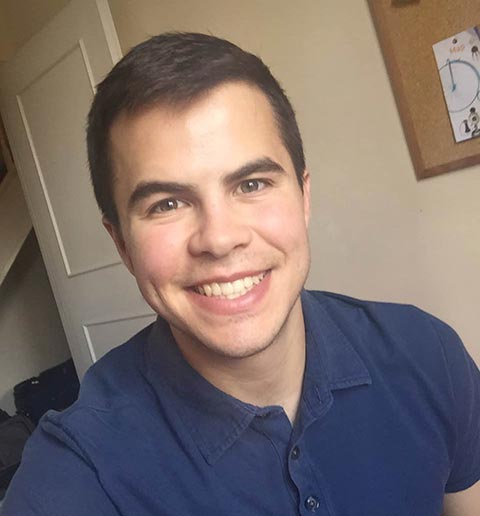
Shore, a Los Angeles native and a journalism/political science major studying in London this semester, joined the station during his freshman year, thinking he could score tickets to concerts as part of the promotions department staff. He was tapped for news instead.
“It was a lot of training, but once I got the hang of it I really loved it,” he said.
He credited general manager George Bodarky and Robin Shannon, assistant news and public affairs director, with mentoring him.
“From the first day, they want you to be the best you can be. You can’t get away with mistakes. I appreciate that they would hammer that in,” he said.
His training included covering a lot of press conferences. One press conference last spring turned out to be especially newsworthy: a group of politicians gathered outside a house in the South Bronx to protest an owner’s use of AirBnB to rent property as a venue for large parties.
“It was a standard press conference, but then it got so crazy,” he said. “Neighbors came out and started yelling at the guy who owns the house, and the guy started yelling back at them. The local politicians were caught in the crossfire.”
Shore’s AirBnB story earned him honors. The excitement of doing it is also one of the reasons he plans to stick with journalism once he graduates, he said.
Casey said he knew from the very beginning that he wanted to pursue broadcasting. He’d already tried his hand at it at St. Peter’s Prep in Jersey City, and he chose Fordham in part because of the opportunities WFUV offered.
In addition to covering two Super Bowls, he has spent the past year traveling with the men’s football and basketball teams. Two of his feature stories—one about the Special Olympics, and another about American Pharoah’s Triple Crown win—received awards.
Winning the award is meaningful to Casey because executive sports director Ahrens, for whom the award is named, is also Casey’s mentor. As sports manager, Casey estimated he speaks to Ahrens every day to receive critiques of all of his broadcasts.
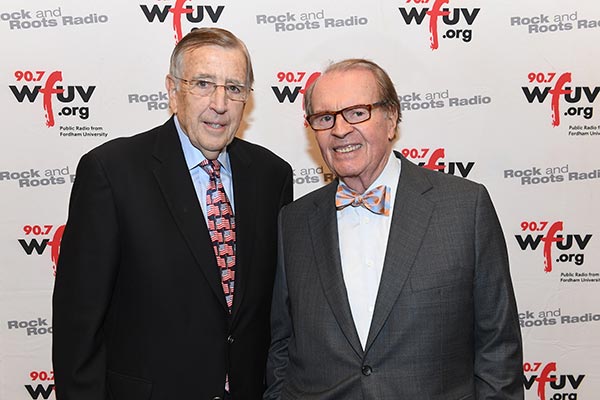
“The time that I’ve spent with Bob has been instrumental in my growth as a broadcaster, as a young sports media professional, and as a person,” he said. “Officially, its work, but it doesn’t feel like it.”
Casey said that upon graduation, he’s considering moving to Montana or Idaho—if he can land a gig broadcasting minor-league baseball.
“It’s my passion. I love doing it. I would certainly pick up and go there if the opportunity was right,” he said.
]]>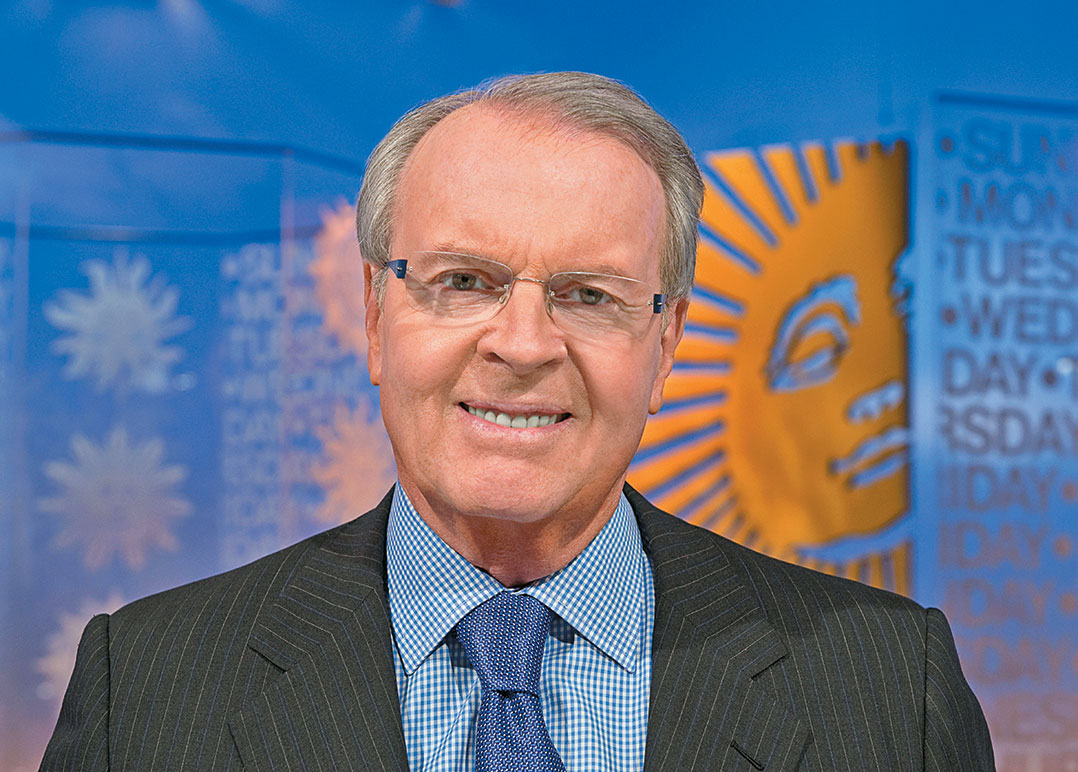
Charles Osgood, FCRH ’54, is signing off as the voice of CBS Sunday Morning after 22 years. The veteran broadcaster’s last show will air Sunday, Sept. 25.
“It’s been a great run,” the 83-year-old told viewers on Aug. 28, when he announced his retirement as anchor of the award-winning newsmagazine program. He said people had been asking why he keeps at it given his age.
“It’s just that it’s been a joy doing it!” he said. “Who wouldn’t want to be the one who gets to introduce these terrific storytellers and the producers and writers and others who put this wonderful show together?”
With his calm, reassuring voice, and the show’s features-focused format, Osgood has offered viewers a serene haven from the hard news of the week. “We accentuate the positive and don’t try to shock,” he once said about the program. “I think there’s a growing appetite for that. We’re surrounded by shock.” When he was inducted into the University’s Hall of Honor, Fordham called him “the voice of Sunday morning, as constant and full of promise as a benediction.”
A leader in the ratings with an audience of around 6 million viewers, Sunday Morning has won three Emmy Awards for Outstanding Morning Program, including one just this year.
In his 45 years with CBS News, Osgood has anchored and reported for every one of the network’s broadcasts, including CBS Morning News and CBS Evening News with Dan Rather. He got his on-air start in the 1950s at WFUV, Fordham’s public radio station, which honored him in 2008 by establishing the Charles Osgood Award for Excellence in Broadcast Journalism.
Fans can take solace in the fact that the beloved host will continue to make good on his weekly signoff to “see you on the radio”: He’ll remain as anchor of his CBS Radio show, The Osgood File. And he’ll make occasional appearances on Sunday Morning.
CBS will celebrate Osgood during his final appearance as anchor with a tribute show that will feature a look back at his legendary career, as well as good wishes from surprise guests and special performers.
]]>Rose was presented the Charles Osgood Award for Excellence Broadcast Journalism, named for legendary broadcaster, WFUV alumnus, and 1954 Fordham graduate.
In his remarks, Osgood complimented Rose for his productivity and his recent inclusion by Time magazine as one of the 100 most influential people in the world.
“I cannot imagine when he sleeps or where he keeps his Legion of Honor medal or all the Peabodys and Emmys and the other cups and plates,” said Osgood. “You deserve them all Charlie. With you accepting it, I feel honored.”
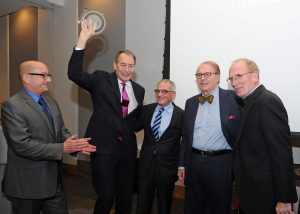
Rose returned the compliment to Osgood, a colleague at CBS.
“He understands that a picture is worth a thousand words, but a word can define a thousand pictures,” Rose said.
Emrick, a play-by-play announcer for NBC and NBCSN, and former voice of the New Jersey Devils for 21 seasons, was awarded the Vin Scully Lifetime Achievement Award in Sports Broadcasting, named after the Hall of Fame broadcaster, play-by-play voice of the Los Angeles Dodgers, and alumnus of WFUV.
Scully, who graduated from Fordham in 1949, lauded Emrick in a taped segment as “nice a guy as ever got into the profession, meticulous in his preparation, and able to effortlessly broadcast hockey matches.” Bob Ahrens, executive sports producer at WFUV, presented Emrick with the award.
Emrick singled out Sam Flood, executive producer and NBC Sports, and Lou Oppenheim, CEO, Headline Media Management as key colleagues.
“For those of you who are students here tonight, 50 years from now I hope you have two people in your life who take as good care of you as Sam and Lou have done for me,” he said.
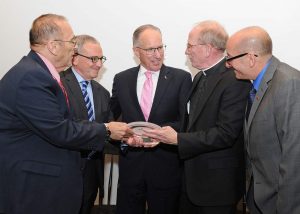
In a post-award discussion led by CBS Sunday Morning correspondent Jane Pauley, Rose said growing up as an only child in a tiny town in North Carolina had a profound effect on him.
“Conversation was the way you found your place—by asking questions, by being able to somehow figure out how curiosity would serve you well,” he said. “That’s where it all began for me.”
Emric, when asked how he manages to narrate the action of a game that moves at lightning speed, said that, ironically, it’s easier at the professional level than in amateur sports.
“When I was riding the bus leagues for several years, you’d have a 5-1 lead and it would become a 7-5 loss because there would be a lot of mistakes made and a lot of changes of possession. But at the level I get to work at now, its much more predictable,” he said.
The fundraising event, which replaced the annual gala that WFUV began celebrating in 2008, raised $200,000. On May 13, 2016, the station will celebrate its musical heritage with “The FUV High Line Bash: A Moveable Feast of Music and Food,” at Milk Studio in lower Manhattan.
]]>“I like doing the quirkier stories,” she says. “I’ve discovered there’s something wonderful about seeing the special in the everyday, in bringing the stories of everyday people to life.”
Just like the show’s host, Charles Osgood, FCRH ’54, Kugel got her start reporting in New York City as a student journalist for WFUV, Fordham’s public radio station. Her current position at CBS takes her across the country.
This summer, during what Kugel calls a typical week, she attended a reenactment of Lincoln’s funeral in Springfield, Illinois; conducted an interview with the band Little Big Town in Nashville, Tennessee; produced a story on an 80-year-old Wurlitzer organ player in Los Angeles; and profiled Bo Derek at her ranch in Northern California.
Some of Kugel’s favorite stories include covering a conference for Gone with the Wind enthusiasts, profiling a ship-in-a-bottle builder, and interviewing Sergei Filin, the artistic director of the Bolshoi Ballet.
Whatever the topic, Kugel’s role as a producer allows her to craft each story from the beginning, to be “involved from the very spark of the idea to the completion,” she says.
“At Sunday Morning I get to kind of be a student for a living—I get to become somewhat of a subject matter expert on a ton of different topics for a short period of time. And I get to bring these stories that people might not otherwise have known about to light. That storytelling aspect is really why I do what I do.”
Kugel’s talents have helped Sunday Morning maintain its indelible status as a top-ranked morning show. The program has won two Emmys for Outstanding Morning Program during her three years as an associate producer. Each time, the staff celebrated with an ice cream party.
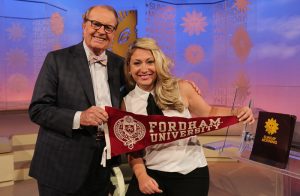
Kugel keeps her first Emmy on the mantelpiece in her Upper West Side apartment.
“When I graduated from Fordham, I made a promise to my mother that I would give her my first Emmy,” Kugel says. “She let me keep the first one on my mantel, but she reminded me about that promise when I got this most recent one.”
Kugel maintains strong ties with Fordham in both her personal and professional life. At past alumni events, she has discussed how networking at Fordham, and at WFUV in particular, helped jumpstart her career. In fact, each of Kugel’s three post-graduation positions—at ABC, WOR, and now at CBS—has been the direct result of a Fordham connection.
“Charlie [Osgood] and I talk about Fordham all the time,” she says, adding that her core group of friends has remained the same since her freshman year.
She also just completed a two-year stint as the chair of Fordham’s Young Alumni Committee, where she helped institute the new and popular All-Jesuit Alumni Happy Hour series. “I definitely think this is something that will become a tradition for young alumni. [It’s] what I’m most proud of during my time at the head of the committee.”
Though she recently ended her term as president, Kugel plans to stay very involved with the Young Alumni Committee and hopes to attend both Homecoming and the Young Alumni Yacht Cruise this fall. But what she’s most looking forward to is Jubilee 2016. “It will be my five-year reunion,” she says,“I’m already making plans for it.”
In her office at CBS, just above her desk, hangs a Fordham pennant. “Fordham will always feel like home to me,” she says. It’s part of her story.
]]>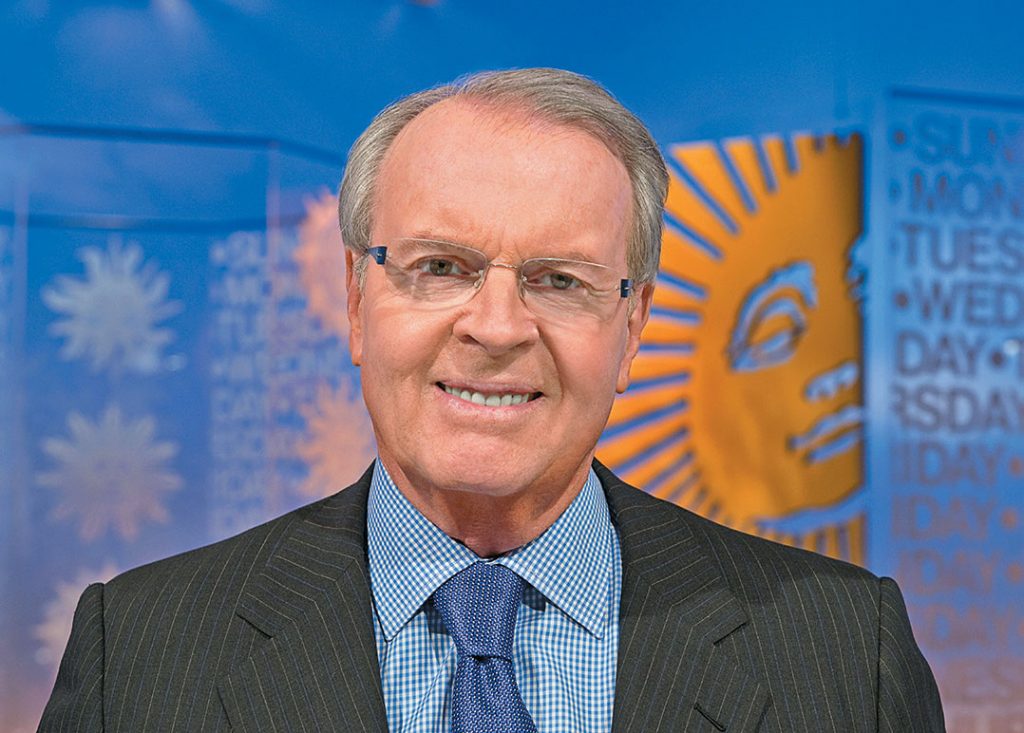
Charles Osgood, FCRH ’54, and the staff of CBS Sunday Morning took home the 2015 Daytime Emmy Award for Outstanding Morning Program on April 26, beating out Today and Good Morning America. Osgood has served as anchor for the well-loved newsmagazine show since 1994, and has been with CBS for 48 years.
With its features-focused format and attention to the arts, CBS Sunday Morning offers viewers a more serene alternative to other morning shows. “We accentuate the positive and don’t try to shock,” he once said about the program. “I think there’s a growing appetite for that. We’re surrounded by shock.”
The veteran broadcaster got his start at WFUV , Fordham’s radio station, as an undergraduate during the 1950s. Sixty years later, he is a still a big fan of the station, which honored him in 2008 by establishing the Charles Osgood Award for Excellence in Broadcast Journalism. Past winners include Tom Brokaw and Christiane Amanpour, both of whom received their awards from Osgood himself.
This year, Osgood will present the award at WFUV’s new fall fundraiser On the Record, a news and sports award dinner. The Nov. 2 event will coincide with the Future of Journalism Conference, a student-training seminar organized by the station in collaboration with Fordham’s communication and media studies department.
WFUV has long been a training ground for students who go on to successful careers in broadcasting and media. A case in point is Sara Kugel, FCRH ’11, a producer on the Emmy-winning Sunday Morning team.
Osgood and Kugel were not the only Fordham alumni to be honored with a Daytime Emmy this year. Three others were recognized for their work as producers of The Ellen DeGeneres Show, which won for Outstanding Talk Show: Alissa Cote, FCLC ’05, Korey Provencher, FCRH ’99, and Jonathan Norman, FCLC ’96, who serves as co-executive producer.
For more information about the On the Record event, which benefits student-training programs at WFUV, contact Alexis Harrigan, director of development for the station, at [email protected] or 212-636-6508.
]]>
The event, which took place at Three Sixtyº in the Manhattan neighborhood of Tribeca, raised nearly $400,000.
That sum, which includes $25,750 from a silent auction held at the event, brought the total raised at the series of annual galas to $2.1 million. Money from the events supports the capital needs of WFUV, Fordham’s public radio station, including facilities and technology.
In addition to the awards for Los Lobos, Brokaw, and Summerall, the station honored its general manager, Ralph Jennings, who is retiring after 25 years.
“WFUV has the most interesting programming format in the metropolitan area, and maybe the country,” said Joseph M. McShane, S.J., president of Fordham. “The man who has been the architect of WFUV’s greatness, and who directed everything so that the station achieved the status it now enjoys, is Ralph Jennings.”
In awarding Jennings the Lifetime Achievement Award, Stephen Freedman, Ph.D., provost of the University, noted that under his management, the station grew from a weekly audience of about 30,000 to 300,000, with more than 22,000 members. He oversaw WFUV’s transformation from an exclusively student-run station to one that employs 30 full-time professionals and 90 students.
 |
|
Ralph Jennings, Peter Madonia, John M. Tognino and Stephen Freedman, Ph.D.
Photo by Bruce Gilbert |
Peter Madonia, a member of the WFUV advisory board, called Jennings a founding father, much like the music visionaries played on the station.
“What separates Ralph’s vision from other stations was he understood that what’s important in life is relationships,” Madonia said. “He insisted that the station create and nurture a relationship with its audience.”
Jennings was greeted with an extended standing ovation.
“I’d like to thank all of the staff and the students at WFUV who have done so much to keep the station going these last 25 years. Obviously I did very little of it, and they did all of it. It’s just amazing what our professional staff and our student staff can do,” he said.
“I also want to thank you, our listeners and our supporters; you’re key in what we do. We’ve all had a good time building a community in the neighborhood of 90.7 FM.”
Charles Osgood, in presenting Brokaw with the Charles Osgood Lifetime Achievement Award in Broadcast Journalism, called him the most trusted man in broadcasting.
“The last thing in this world that Tom needs is another award. He’s won just about every award that there is in this business,” Osgood said. “When I called him to tell him he’d finally reached the pinnacle and was going to receive the Charles Osgood award, he graciously accepted,” he joked.
Brokaw, who was Fordham’s commencement speaker in 2009, said that WFUV and media outlets like it are more important than ever.
“It is critically important, in these times especially, that we have a quiet voice of reason and sanity available for all of our citizens,” he said. “I grew up as a child of radio on the Great Plains, and it always spoke to me about the life that was going on beyond the horizon.”
Summerall received the Vin Scully Lifetime Achievement Award in Sports Broadcasting from fellow former New York Giant Frank Gifford. Summerall also was honored by Scully, whose remarks were played via video from Los Angeles, where Scully broadcasts games for the Dodgers.
“Pat is well remembered by the New York Giants and always will be,” Gifford said. “He’s a very special person for all of us who’ve ever associated with him, and I’m delighted to be here this evening to present this award.”
Summerall recalled working with Scully for a year, noting that he admired his storytelling ability.
“To work next to him, to hear what he had to say and how he said it, that’s a privilege only a few get to enjoy,” he said. “To work with Vin Scully, to see him perform under pressure—and believe me, he was under pressure a lot—makes me very grateful to receive this award.”
 |
|
Los Lobos and attendees finished the night with a rousing version of “La Bamba.”
Photo by Bruce Gilbert |
Before concluding the evening with a seven-song set that brought guests onto the dance floor and ended with audience members on stage singing along to “La Bamba,” Los Lobos received the Sound and Vision Award from Alejandro Escovedo. He noted that Los Lobos, which his band opened for in 1982 in Austin, Texas, has been going strong for 38 years.
“Growing up as a Chicano in Texas and California, it was really important to have people like Los Lobos as an inspiration,” Escovedo said. “Not only did they teach me a lot about my own culture in the music that they played, but they went beyond that and broke down boundaries as to what rock should be by incorporating traditional music with modern rock sounds.”
]]>